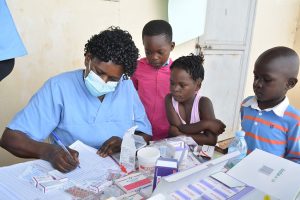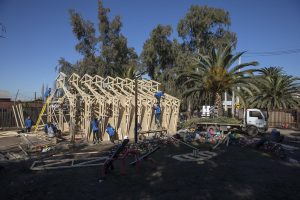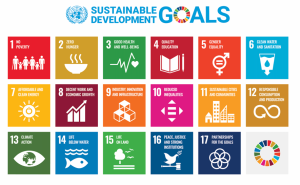“The University saved my life”: SACRU solidarity in action
Ahead of the United Nations Human Solidarity Day and the approach of Christmas, SACRU Universities describe their plans to leave no one behind
Cooperation projects in Africa, more than 1,000 young people who spend their time building houses and chapels in Chile, direct welcome of young people fleeing the war. These are just some of the projects launched in recent years by the partner universities of the Strategic Alliance of Catholic Research Universities (SACRU). The International Day of Human Solidarity on Tuesday, Dec. 20, is an opportunity to recount and share social and solidarity initiatives organized by the eight partner universities in different parts of the world. These projects originate in different contexts but share the same goal: to leave no one behind. Solidarity is often used only in the abstract to describe support for the most vulnerable. With increasing social and economic inequalities, numerous humanitarian crises and conflicts, and climate emergencies, it is necessary to move from words to deeds to help those in need concretely.
Contributions by SACRU Universities
Università Cattolica del Sacro Cuore (Italy)
Improvement strategies for the prevention
and clinical management of HIV, TB and malaria
Università Cattolica del Sacro Cuore, through its Centre for International Solidarity, participates as a lead partner in the international cooperation intervention The Community Outreach as a model to serve the women of the slum in the urban area of Kampala. Improvement strategies for the prevention and clinical management of HIV, TB and malaria, funded by the Italian Agency for International Development Cooperation (AICS) via The Global Fund. Project partners are Fondazione Italia Uganda Onlus and the Benedict Medical Center, a small health centre near Kampala, Uganda.

The project, started in January 2021 after some suspensions due to the outbreak of the Covid 19 pandemic, aims to contribute to the fight against the spread of sexually transmitted diseases, TB and malaria, in Uganda, through the promotion of Community Outreaches and, in particular, of pathways for the prevention and treatment of sexually transmitted diseases in women in the project’s target communities. Four community outreaches were promoted as part of the project, involving the Kireka and Kisenyi communities in Kampala. Through Community Outreach, the project promotes an agile, innovative model that is fully in line with the social, economic and health conditions of the beneficiary communities, thus providing a contribution, albeit on a small scale, to the fight against the spread of sexually transmitted diseases, TB and Malaria in Uganda, while maintaining a firm focus on the need to promote both treatment and prevention of the diseases covered by the project.
Each CO is organised as follows:
- Recruitment phase: after registration by the health workers, a questionnaire is administered to the participants to test their awareness of their health status and level of knowledge on the topic of sexually transmitted diseases, HIV, TB and malaria;
- Training: during the CO, health workers organise some training sessions on sexually transmitted diseases, HIV, TB and malaria, during which they inform participants about the main symptoms associated with the diseases as well as the most commonly associated risk factors and illustrate the behaviour to adopt in order to prevent infections and possible treatment paths; during the day, an ad hoc training session is also organised for participating women, who are encouraged to invite other women who may be in particularly risky situations;
- Diagnostic tests: following the training sessions, the following diagnostic tests will be administered to participants. Some tests will be carried out directly on the CO’s site and the results will be available at the time; others will be carried out at the Benedict Medical Centre and the results will be available within a week.
Thanks to this project, more than 2,000 people benefited from graded screening during community outreach, and of these more than 1,200 were pregnant women.
Universidade Católica Portuguesa (Portugal)
Written by Inês Espada Vieira, Professor of Culture Studies
Universidade Católica Portuguesa saved me from darkness
“Universidade Católica Portuguesa saved me from darkness.” These are the words of Ouwais S., a student of Communication Studies. He wrote them in July 2022, in a non-academic context, after explaining how he felt in 2019, when he arrived in Portugal from Syria: “Could you imagine suddenly finding yourself in a dark tunnel, not knowing where it ends and what you will have to face as you walk through it; forced to walk against your will; you cannot turn back or even stop to look around or give yourself a chance to think? That was my situation when I was in my country, devastated by war.”
Joining the Portuguese national effort in welcoming and integrating refugees, in the week of the International Refugee Day of 2022, Universidade Católica Portuguesa (UCP) opened special applications with tuition waivers: a total of 24 vacancies in 17 B.A. programs in Lisbon, Braga, Porto and Viseu. There are currently 13 refugee students at Católica, comprising six different nationalities. Of these refugees, nine are women, eight are displaced from the war in Ukraine, and two are first-time university students. UCP welcomed these students, committed to the Sustainable Development Goals and as part of the global effort of 15 by 30, presented by UNHCR, so that by 2030 15% of refugees, that is 500 000 men and women, can be studying in higher education.
Being a university student is not just about academic opportunity. It is also to rediscover one’s vital identity and go beyond the refugee condition. It is about having the opportunity to invest time and dedication into something that, while not immediately important in a present emergency adaptation, is essential for a fulfilling future and integration. We are aware of the difficulties; we accompany our students in their struggles and accomplishments, respecting hesitations and decisions. Promoting and integrating refugee students (cf. Pope Francis message for the 104th World Day of Migrants and Refugees, 2018) is a long-term commitment for a university fully aware that education can indeed save people from darkness.
Pontificia Universidad Católica de Chile (Chile)
Written by Benjamin Cruz, Director of the Pastoral Ministry
Christian solidarity projects of UC Chile will mobilize more than 1,000 young people
Concern for those most in need is at the heart of UC Chile, which is why the university has several solidarity projects and programs that seek to be a contribution to society, either through learning and service courses, as well as projects organized and coordinated by students, such as those of the Pastoral UC that we present below.
Country Mission (Misión País), Country Chapel (Capilla País), Sowing and Housing (Siembra y Viviendas) are projects of the Pastoral of the Pontificia Universidad Católica de Chile (UC Chile), whose volunteers will be between January 4 and 14 building chapels and homes, in addition to accompanying people delivering Christ’s message of hope, in 46 locations in 9 regions of Chile, with the youthful energy that characterizes them. On Wednesday, January 4, 1,150 young people will gather in the church of the San Joaquin Campus of UC Chile so that Monsignor Celestino Aós, UC Chile Grand Chancellor and Archbishop of Santiago, will send them on their mission in the Mass of departure. Then, in communities, they will board the buses that will take them to the localities where they will carry out their mission. The missions will last until January 14, when, in addition to the construction, volunteers will carry out activities with the neighbors of different communities and reflective meetings about the contingency and their role as Catholics in society.

A brief history of these initiatives:
Country Mission (Misión País) is a student project that since 2004 has taken more than 30,000 young missionaries to nearly 500 areas from the city of Arica in Northern Chile to Punta Arenas in the south.
Country Chape (Capilla País) was born as an initiative that sought to build new temples for the visit of Pope Francis to Chile. Since its creation in 2015 they have built 101 chapels in the country.
Sowing UC Chile (Siembra UC) is a missionary project where university students lead groups of schoolchildren, generating spaces for formation and vocational exchange, in addition to bringing the word of Christ with the vitality that characterizes them.
After a great work with the families, for the first time “Viviendas” (Housing) will build 7 homes in the communes of Batuco and Lampa, responding to the housing deficit crisis Chile is going through.
Young exchange students or foreigners who want to participate in these projects are always very welcome, which has been seen in the participation of students from different parts of the world. In case other young people from universities outside Chile want to participate, they can register at: https://acutis.uc.cl/
Pontificia Universidade Càtolica do Rio de Janeiro (Brazil)
Solidarity initiatives
Scholarships for low-income students
PUC-Rio, a philanthropic and community university, is committed to offering scholarships for higher education for low-income students. In 2022, promoting a more inclusive institutional policy aligned with the University’s Identity and Mission has benefit 4805 (~50%) undergraduate students. Besides this, PUC-Rio offered 2072 (~90%) scholarships for graduate students.
Cooperation and Development Projects
PUC-Rio has 117 projects with more than 786 professors and staff directly involved within Cooperation and Development Perspective.

Volunteering initiatives, and charity programs in developing countries
PUC-Rio has more than 139 initiatives, with more than 200 professors and staff directly involved in volunteering initiatives and charity programs in developing countries.
Social entrepreneurship & start-up
The Social and Environmental Impact Entrepreneurship Program 2.0 aims to train and develop entrepreneurs, projects, and businesses that seek to solve a social or environmental problem related to the 17 ODS. In the 2022 edition, it supported 20 socio-environmental projects. The Ideiaz initiative aims to support innovative ideas with socio-environmental impact. Those projects will become startups, generating jobs, innovative products, and services. In 2022, it supported eight ventures from all regions of Brazil.
The Impact Germination Program is a cooperation agreement aiming to foster education programs online and free to support socio-environmental impact businesses. The selection of businesses will highlight eight projects/businesses to be pre-incubated by Genesis PUC-Rio over six months. This project aims to foster the region of Angra dos Reis, contributing to the conservation of flora, fauna, and Brazilian diversity and services ecosystems. Developing Rocinha’s Social Impact Incubator – JUMP aims to support initiatives with a socio-environmental impact, whose purpose is to generate jobs and income to reduce violence and encourage the production of technology in the territory of Rocinha slum.
Universitat Ramon Llull (Spain)
Written by Isabel Vergara, Communication director of the Pere Tarrés Foundation
Charity projects for children and young people in vulnerable situations
Education in free time is a very valuable educational time, a unique experience that contributes to the growth of children and young people throughout people’s lives. Leisure-based education is one of the rights outlined in the Declaration of the Rights of the Child. Unfortunately, not all the children in Spain can exercise this right. Currently, 30% of children in Spain live below the poverty line, and leisure time is often when social exclusion is starkly highlighted.
The impact of educational activities in free time is even more positive and necessary for children in vulnerable situations. Children relate to one another and learn through play. It is their language, their way of discovering the world, and, therefore, an essential way of acquiring new knowledge, socializing, growing, and developing in the best possible way. For this reason, at the Pere Tarrés Foundation, we carry out projects so that children from families without resources can take part in activities that provide education through leisure and give them the same opportunity as other children to enjoy a full life. The Pere Tarrés Foundation is one of the Faculties that is part of Ramon Llull University, where it offers two degrees in Social Education and Social Work.
The Pere Tarrés Foundation’s solidarity projects are intended to ensure that more than 12,000 children and young people from Spain who live at risk of poverty have the chance to take part in leisure activities all year round and, at the same time, improve their physical and emotional well-being. The solidarity of companies and individuals helps us make this possible. The social workers and volunteers work every day so that all children, regardless of their origin and social condition, can develop humanly, spiritually, emotionally, and competently so that, in the future, they can enjoy a full life. We help families in vulnerable situations with weak family networks or none so they feel supported in bringing up their children. The aim is to get them away from the anxiety of their everyday situations and destructured environments.
The right to play is also part of this accompaniment that we carry out. And now that the Christmas dates are approaching, we are launching a solidarity campaign to collect toys and school supplies, in which the Ramon Llull University faculties are also participating so that all children can enjoy the excitement of Christmas.
